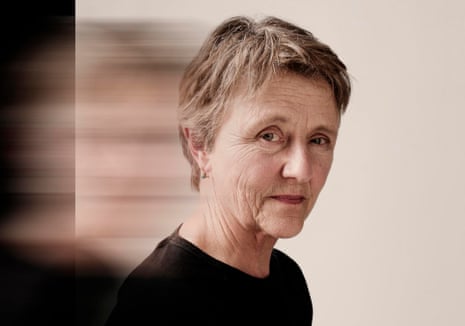Helen Garner
Stories and True Stories
Text Publishing
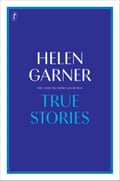
Your books in your words: The stories that make up these two books have been spread all over the map for years. I never imagined they’d be raked up and pulled together and rearranged into such beautiful volumes.
When the big blue non-fiction one arrived in the mail I was stunned by its bulk: it was my first fat book. I walked round the house carrying it in my arms. I don’t know if all writers are like this but I’ve always secretly thought of myself as a terrible bludger. It showed me beyond all doubt that, for 40 years, making a freelance living between books, I have worked like a dog.
I was amazed to see how slim the red book of short stories is, by comparison – it’s almost dainty. I’m so grateful to Text for making these books. I love their plainness and the crazy selection of photos and post-its on the cover flaps. I keep my copies on a high shelf. I don’t want to wear out my happiness by looking at them too much.

What you were reading when you wrote it: Right now I’m rereading Perfume, a beautifully written and very funny study of classic and modern fragrances by two opinionated, merciless American ecstatics, Luca Turin and Tania Sanchez.
The next Australian book you’ll read: Next I’ll read Kate Grenville’s exposé of the perfume industry, [The Case Against] Fragrance, which will probably frighten me away from scent counters for the rest of my life. I’m also curious about The Woman Who Fooled the World: Belle Gibson’s Cancer Con, by Beau Donelly and Nick Toscano: it looks like a ripping yarn about one of my favourite subjects: [fraudsters] who cheat the terminally ill.
Nick Toscano and Beau Donelly
The Woman Who Fooled The World: Belle Gibson’s Cancer Con
Scribe Publications
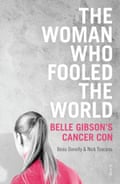
Your book in your words:
Beau Donelly: The Woman Who Fooled The World tracks the meteoric rise and crashing fall of Australian cancer scammer Belle Gibson. My co-author, Nick Toscano, and I were intrigued by the perfect storm of factors that propelled Gibson to global stardom: the conveyor belt of unqualified wellness and nutrition advice being served up online, the new age phenomenon of social media celebrities and their unprecedented reach and influence, and the erosion of the traditional media’s role as gatekeepers in the digital age. This book is an expose of the so-called wellness industry that facilitated Gibson’s rise.
It is as much about those who enabled her – including two of the world’s biggest companies, Apple and Penguin, which failed to carry out even an ounce of due diligence – as it is about the young woman herself. Most importantly, we wanted to explore the infinite desperation felt by cancer patients and their families, and our willingness as a society to believe in anyone, or anything, that offers the false hope of a miracle cancer cure.
What you were reading when you wrote it: I was reading The Spare Room by Helen Garner. Garner’s incredible ability to make the reader feel as though they’re right there, watching the scene unfold, witnessing movement, is something I try to emulate.
The next book you’ll read: I’m almost finished Chris Johnston’s brilliant book The Family and am looking forward to picking up a copy of Sarah Krasnostein’s The Trauma Cleaner, a true story about a transgender Australian woman whose work takes her to crime scenes and into the homes of people living in squalor.
Alexis Wright
Tracker
Giramondo Publishing
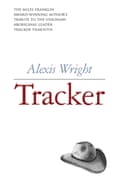
Your book in your words: Tracker is a big book and fitting for one of the true, visionary leaders of our times. Comprised of the voices of more than 50 people, including the subject himself, the art of storytelling shines brightly in this collective memoir of Tracker Tilmouth, an Eastern Arrernte man of enormous intellect, insight and humour.
His story is about working on extraordinary ideas to develop a real Aboriginal economy based on traditional economic principles across northern Australia. This is the true meaning of what he called “the enjoyment of land rights”.
I hope this book gives its readers a picture of an Aboriginal visionary hero who had plenty of humour and wit, and who really understood the politics concerning the rights of Aboriginal people and the times in which he lived. He formed his ideas to develop an Aboriginal economy in northern Australia, to ensure that Aboriginal people, their land and culture would survive in the future.
What you were reading when you wrote it: Tracker was developed over three, four, maybe five years. It is hard to remember the many books I read in that time but I did read everything by the British writer Robert Macfarlane. I liked his mind and the way he saw the country he moved in, and how he wrote about the people he met who lived close to the land and environment. I read these books one after the other before bed, because Macfarlane’s writing about natural places far away from here would always relax my mind.
The next Australian book you’ll read: I will be reading Kim Scott’s Taboo and Bruce Pascoe’s Wild Emu. I am always excited about reading both of these great storytellers and, now that Tracker has been released in such a beautiful, seamless book, I have the space and time to really enjoy their work.
A.S. Patrić
Atlantic Black
Transit Lounge
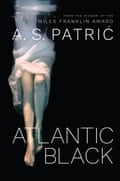
Your book in your words: An ocean liner crosses the Atlantic as 1939 comes into view. It’s new year’s eve on the Aquitania and Katerina Klova, the 17-year-old daughter of an ambassadorial family, finds herself in a world about to disintegrate in the second world war.
Katerina’s own family has already started to come apart. Her brother – an exemplary cadet in a French military academy – has been expelled, her diplomat father is under house arrest in a Parisian hotel and her mother has had a psychotic break only three days into the trip across the Atlantic.
An ocean liner might conjure nostalgic glitter but the Aquitania is public transport. It can be a slum, or a palace, depending on your social position; a floating, ethereal city or a prison steaming across desolate reaches of water. Katerina Klova isn’t sure which as she navigates her way in the 24 hours of Atlantic Black.
What you were reading when you wrote it: I had dismissed Alice Munro as a dull writer until I reconsidered her work after she won the 2013 Nobel prize. I was so impressed by her artistic integrity and vision, I bought all 14 of her fiction collections in one hit and have been savouring these impeccable stories ever since.
The next Australian book you’ll read: I already have Helen Garner’s stories and essays but the two-volume set Text Publishing recently released in hardback are irresistible to a bibliophile, so I’ll be revisiting Garner’s work – which from the beginning of my writing life through to now has been a deep, constant source of inspiration.
Alex Miller
The Passage of Love
Allen and Unwin
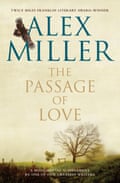
Your book in your words: The Passage of Love follows 13 tumultuous years in the intimate lives of two young people who marry despite their misgivings. Robert Crofts arrives in Melbourne after working for some years as a stockman in Queensland. He marries the beautiful and wealthy Lena.The story follows the troubled years of their marriage as they are each driven by a desire for personal and creative freedom – she to escape her stultifying middle-class background and to find meaning in her life, and he to pursue his dream of becoming a writer. Their relationship, both precious and heartbreaking, lies at the centre of the book. Looking back at himself as a young man, and with the detachment of old age, the narrator examines with a forensic eye the creative and moral challenges of his early life.
What you were reading when you wrote it: I was reading Robert Chandler’s translation of Vasily Grossman’s epic novel Life and Fate. The deeply autobiographical nature of this novel, which is an account of the most tragic and demanding years in Grossman’s life, was an inspiration to me.
The next Australian book you’ll read: I’ll read Alexis Wright’s Tracker. The challenge to the established boundaries of genre in Wright’s work is always intensely stimulating and has long been a source of joy to me.
Richard Fidler and Kári Gíslason
Saga Land
Harper Collins Australia
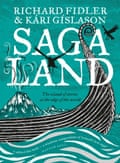
Your book in your words:
Richard Fidler: Saga Land is the story of how Kári Gíslason and I became good friends and travelled across Iceland together, collecting stories. We wanted to immerse ourselves in the sagas of Iceland – the true tales of the first Viking families who settled on that island in the middle ages. We travelled out to the locations where the sagas took place, through the farms, streams and fjords of the most fiercely beautiful country in the world. But we were also hoping to solve a family mystery that might connect Kári to the greatest of the saga authors: Snorri Sturluson, a brilliant Icelandic chieftain and lawyer who was murdered in his cellar in 1241. Along the way we picked up several ghost stories, a gruesome account of a witchcraft trial and the tale of the greatest chess match of the 20th century.
Kári Gíslason: The last time my father and I talked at length, he told me that I was descended from Snorri Sturluson. Over the years, I came to this see this suggestion as a rather lovely gift that he’d offered me, and so Saga Land is in part a chance to open that gift and look inside – to see whether what my father said was true and think about what his words that day might mean for my relationship with Iceland, its saga stories and with him.
What you were reading when you wrote it:
Richard Fidler: The Prose Edda by Snorri Sturluson. This fabulous compendium of Norse myths – written in an isolated Icelandic farmhouse in the 13th century – is our primary source for the stories of Odin, Thor and Loki. It continues to influence world culture today, from Wagner to Tolkien to Marvel comics.
Kári Gíslason: I re-read the classic medieval Icelandic work Njal’s Saga, author unknown. There were so many wonderful details in this saga that I’d forgotten and that I now realised were crucial to how we might meet and understand the distant world of the sagas.
The next Australian book you’ll read:
Richard Fidler: True Stories, the collected short non-fiction of Helen Garner. Reading Helen’s work is always a delicious and occasionally harrowing experience. Her writing is always so clear-eyed, exacting and honourable, drawing us into some truly dark and strange places.
Kári Gíslason: Their Brilliant Careers by Ryan O’Neill. In the past, I’ve enjoyed Ryan’s short stories and I hear this novel is a lot of fun.
Under the Cold Bright Lights
Garry Disher
Text Publishing

Your book in your words: I’m best known for the Wyatt crime-from-the-inside series and the Challis and Destry police procedurals but, to stave off staleness, I sometimes write other types of fiction or explore different crime-fiction characters.
Set mostly in Melbourne, Under the Cold Bright Lights deals with a detective brought out of jaded retirement to work cold cases. Called a “retread” by the younger detectives, who see him as a threat, he has a messy private life and the niggling memories of cases left unsolved from his days in the homicide squad. One of these involves a doctor he believes murdered two of his wives, another an elderly farmer whose death was wrongly ruled accidental.
Meanwhile a skeleton has been found under a concrete slab in Pearcedale and various senior officers have concerns about some of his recent decisions.
What you were reading when you wrote it: Admiring the Appalachian writer Ron Rash, I reread his older titles and those recently published in Australia, including The World Made Straight. Rash’s mountain country is unlike the wheat plains of my novel Bitter Wash Road but I see parallels in terms of isolation, stasis, change, loss, young people at a crossroads and rural crime.
The next Australian book I’ll read: Tony Birch’s Common People is on my Christmas present hint list. A perceptive chronicler of every day life and ordinary people’s messes and disasters, Birch is a compassionate writer. He doesn’t judge and has a perfect ear for dialogue, letting it reveal not only personality but the stories lurking between the lines.
Domestic Interior
Fiona Wright
Giramondo Publishing
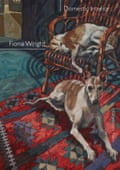
Your book in your words: Domestic Interior is a book about the suburbs – that strange and complex space in which so many of us live but about which we still feel a deep ambivalence. I grew up in the sprawling south-west of Sydney and now live in its inner suburbs, and these places are so different and disparate that it’s remarkable to me that the same small word should describe them both.
In a way, it’s also a book about ordinariness: ordinary spaces, like shopping centres, houses, cafes (some of my favourite poems are based on overheard conversations and the truly startling things that people reveal about themselves in cafes and bars), and ordinary experiences, like driving, or family dinners, and the meaning and the poetry that we might find there.
What you were reading when you wrote it: Gwen Harwood’s Collected Poems 1943–1995. I love Harwood’s poems about suburbia, for the way they mingle a razor-sharp wit – she’s a wickedly funny poet – and great affection, and find real love and deep emotion alongside the absurd.
The next Australian book you’ll read: I’ve just started reading Helen Garner’s True Stories, which is a tome of a book that I only meant to dip into but have found myself devouring. I’d forgotten how heart-wrenching and lyrical she can be, and how much she’s influenced my writing.
Peter Carey
A Long Way from Home
Penguin Random House
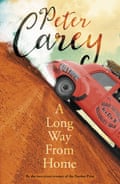
Your book in your words (as told to Stephanie Convery): This is a book made from two sets of maps.
What you were reading when you wrote it: I had so many books, papers, [articles and] research papers that I read online – just piles of papers that I couldn’t even find my way through. There will always be books that don’t seem to be anything to do with what you’re doing and, because novelists are magpies anyway, anything can have something to give. Sometimes it can be a tiny thing.
The next Australian book you’ll read: I’m reading a book by Brian Matthews on Manning Clark which is giving me enormous pleasure ... Maybe I didn’t know enough about Manning Clark, maybe it’s nostalgia for a certain sort of country town’s life: cricket.
